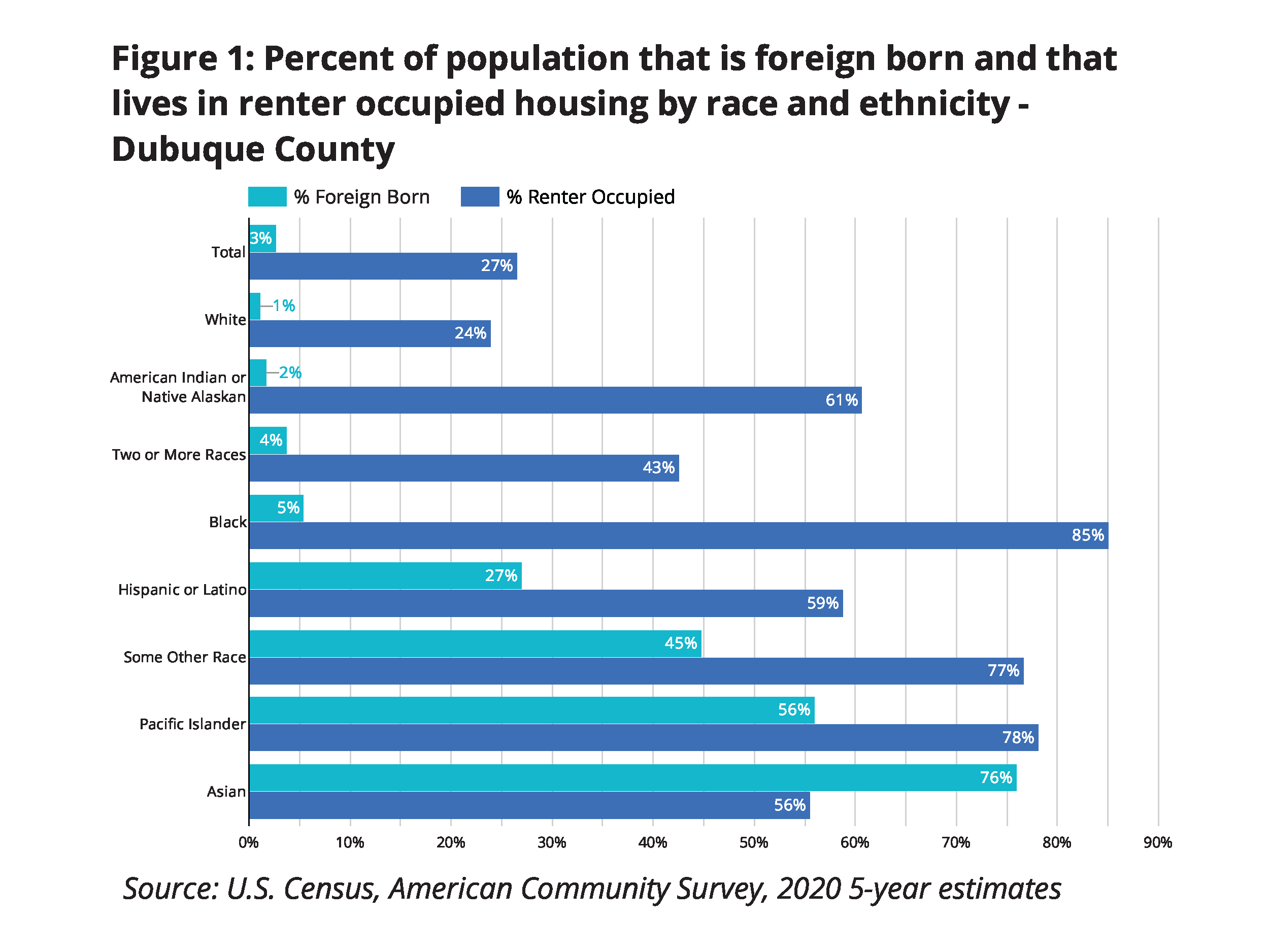Housing

Quality, affordable housing continues to be an ongoing need throughout the region, with an estimated 40% of renter-occupied households in Dubuque County spending 30% or more of their income on rent.[1] The estimated number of renter-occupied households decreased between 2015 and 2020, despite a growing population throughout the county.[2] Iowa only has forty-six affordable and available rental homes for every hundred extremely low-income renter households.[3] For low-income families especially, being able to identify affordable housing that does not have significant safety or structural problems can be a challenge.[4] In 2022, the East Central Iowa Association (ECIA) conducted a housing needs assessment for the City of Dubuque found that there was a high and unmet need for housing units within Dubuque, and concluded that the city should be designated as a distressed housing community.[5]
Many immigrants face barriers to obtaining quality housing. Due to limited social networks and lack of familiarity with housing systems when first arriving here, many immigrants rely on housing recommendations from friends or family. This can produce a limited number of options, often resulting in immigrant populations living in the same neighborhoods or apartment complexes (this is also likely due, in part, to immigrants wanting to live near friends and family). This can be exacerbated by language challenges, preventing some immigrants from finding certain options or connecting with available resources. A lack of a credit history or a steady source of income can also factor into an immigrant’s ability to find stable housing. Many landlords struggle with renting to immigrant families. This may be due to a requirement for social security numbers or other forms of ID for background checks, difficulties with communication, or a larger discomfort working with immigrants, perhaps stemming from cultural differences or a lack of familiarity with those populations. At times, anti-immigrant biases may lead landlords to avoid renting to immigrant families.

Taken together, these barriers create risks and challenges for many immigrants. These might be as simple as having a limited pool of available housing to choose from, forcing immigrants to take lower-quality or more expensive options than might otherwise be necessary. It could also lead to overcrowding, especially if immigrant families live in multi-generational households or share housing with other families due to low income or a lack of options. These barriers can result in landlords having significant leverage over immigrant tenants, who may not be able to advocate effectively for themselves, easily move to another living space, or feel comfortable reporting issues to government authorities. This scenario poses the risk of unfair price increases and other exploitative practices. These additional barriers increase the risk of situations where individuals may lose housing and be unable to find a suitable replacement, placing many immigrant families in a vulnerable position.
There are many examples of individuals and organizations in the region responding to these challenges in positive ways. In several cases individual residents have come forward to offer housing options to vulnerable families, including in rural areas where housing shortages have become a major issue. Volunteers and organizations have also served as advocates for immigrant families, helping to negotiate with landlords and resolve unexpected issues. Collective approaches have seen some benefits as well.
In 2021, the Community Foundation, the City Housing and Community Development Department, and a number of nonprofit organizations came together in response to a rapidly developing situation where a group of immigrants were losing their housing after new management instituted a stricter background check that required a Social Security Number. After convening, the City of Dubuque revised its housing background check form to provide other ways of accessing information, and representatives from the City met with the new management group to explain the situation and provide the new form. These and other examples, including the recommendations that follow, reflect the many important efforts that take place throughout the region to address housing challenges for immigrant communities.
Recommendations
The explore recommendations to help address barriers to housing for immigrant populations, click here.
Continue Reading
Use the following links to learn more about different issues facing immigrant communities:
- For Case Management, click here
- For Education and Youth Support, click here
- For Health, click here
- For Legal Assistance, click here
- For Translation and Interpretation, click here
- For Workforce and Employment, click here
To return to the Immigration Community Assessment welcome page, click here.
